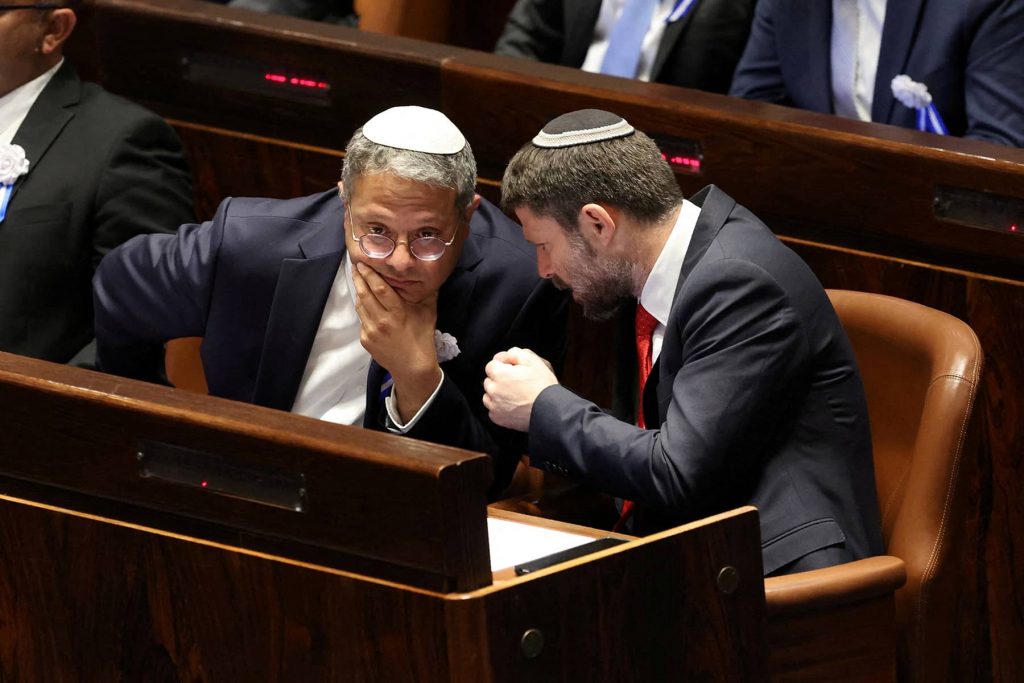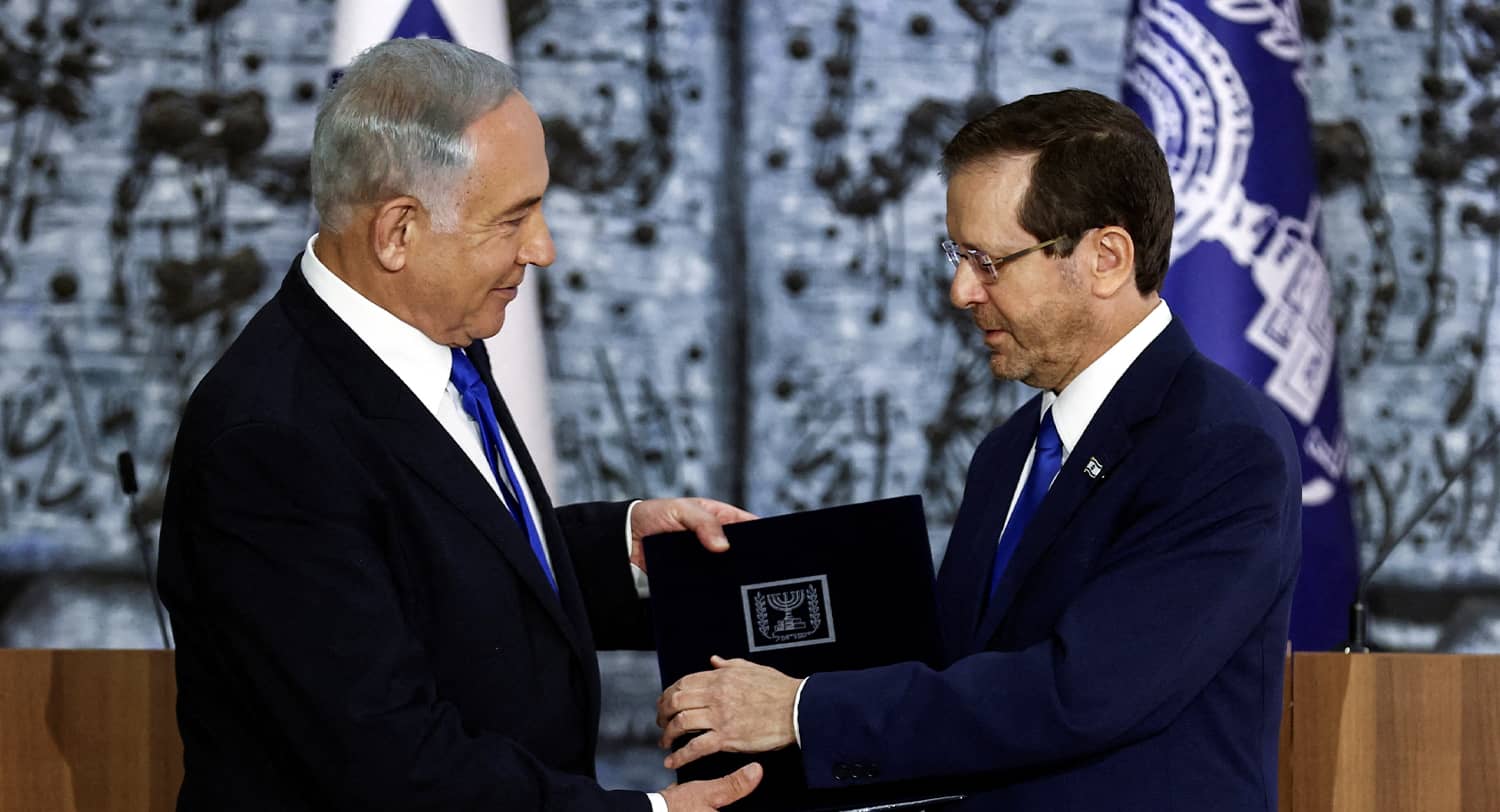The Knesset elections in November ended in a virtual tie between the left and right in terms of votes cast. But Netanyahu proved far more skillful in organizing the parties of the right than Yair Lapid did on the left, resulting in a decisive parliamentary majority for Netanyahu. The question now is whether he can hold off the radical demands of far-right coalition partners. This will prove difficult, especially on the proposed changes to West Bank settlement policy, perhaps forcing Netanyahu to turn to centrist parties.
Israel’s parliamentary elections on November 1, 2022 was the fifth election in three and a half years. Like the previous four, it was a contest between two camps—“Only Bibi” and “Anyone but Bibi.” The latter camp swore never to sit in a government headed by Netanyahu, even if offered a rotation of the prime minister’s position, bearing in mind what had happened after the elections of April 2020. At that time, Netanyahu promised Benny Gantz that he would become prime minister after a year and a half, only to break up the coalition and opt for another round of elections before Gantz’s rotation took effect.
The commitment by the anti-Bibi camp did not mean that they would reject the Likud Party and its positions—only its leader, Netanyahu. This is very different from the position adopted by Ben-Gurion in his days as a party leader, during Israel’s first fifteen years. At the time, he coined the phrase “without Herut [the forerunner of today’s Likud] and the Communists,” ruling out cooperation with the right- and left-wing extremes of the political spectrum. Ben-Gurion’s opposition was to extreme policies, not to individuals.
Today the most acute policy problem Israel faces is the lack of governance, in various manifestations. It surfaces regularly in the media, with reports of gang warfare often within the Israeli Arab community and again as intercommunal hostility within Israel during the May 2021 round of fighting with Hamas in Gaza. The anti-Bibi camp failed to focus on the implications of this overriding issue. In-depth polls indicate that the other main public concern—the cost of living, and particularly the housing prices—had little or no impact on voting patterns, but the lack of governance did have an effect.
The most adroit and quick-footed player to grasp this impact among potential voters was Itamar Ben-Gvir, leader of the Jewish Power Party (which ran in a joint list with two other right-wing parties—the ultra-nationalist Religious Zionism Party led by Bezalel Smotrich and a smaller, radical anti-LGBTQ group). Ben-Gvir addressed the lack of governance obsessively, day in and day out, thus diverting the voters’ attention away from the extreme right-wing ideology he espouses. Reading into the election results, it can be said he achieved two main outcomes:
- The level of voter participation in areas known to vote for the right wing, such as the towns in the south, increased, resulting in votes for the Ben-Gvir–Smotrich list. A smaller number of voters returned to the Likud, increasing it by two seats to 32.
- Ben-Gvir actually managed to draw anti-Bibi voters over to the Only Bibi camp. He was able to generate the notion that he alone has a solution to the rise in crime and capitalized on the growing sentiment against the Arab sector in the wake of the May 2021 events. Pollsters found that the flow from camp to camp was mostly due to young voters who shifted from Defense Minister Benny Gantz’s centrist party, the State Camp, to the hard right. Gantz should have highlighted the detailed plan to restore law and order belatedly put forward by his partner, former Chief of Staff Gadi Eizenkot. But that plan came out far too late and without the necessary fanfare that could have countered Ben-Gvir’s buzz.

Overall, the election results revealed three mistakes made by the anti-Bibi leaders, particularly Prime Minister Yair Lapid.
- Given the pollsters’ pre-election predictions, the Lapid government should have passed legislation to lower the electoral threshold for parliamentary representation from 3.25% to 2.5% of the votes cast. Polls showed that four anti-Bibi parties were in danger of failing to cross the 3.25% threshold. This meant that their votes would be entirely lost. Lapid chose, however, to coordinate with the leader of the ultra-Orthodox Shas Party, Aryeh Deri, and keep the threshold where it was. The result was that two parties of the left—Meretz and Balad, with 270,000 votes between them—failed to pass the threshold, giving the Netanyahu bloc 64 rather than 60 seats in the Knesset (with 61 seats needed to form a majority).
- Another fatal mistake was the fragmentation of the Arab vote, which went to three different party lists that did not join together in a technical bloc, as in the past, or even sign an agreement that would have ensured that excess votes (above the number of seats the party wins) would go to another party. Such an agreement between the Arab parties would have added one more seat to the anti-Bibi camp.
- Lapid, who presented himself as leader of the anti-Bibi camp, did nothing to ensure that votes would not be lost within his camp. He could have forced his colleagues to agree to excess vote arrangements, as already noted. He should have worked with Labor Party leader Merav Michaeli to convince her to enter into a technical bloc with Meretz on the left (which is what Bibi did with his coalition partners on the right). Michaeli’s argument that Labor and Meretz would gain more votes separately than if they ran together was not based on polls or past experience. It ended up with the anti-Bibi camp losing Meretz altogether, while Labor was barely saved from oblivion by a fraction of a percentage point.
It may well be that Lapid intended to enhance the share of his own party, Yesh Atid, at the expense of the anti-Bibi camp as a whole. If the actual votes for each camp are counted in aggregate, their numbers are basically equal, which should have produced a Knesset split right down the middle, rather than providing Bibi with a decisive win.
Back in 1992, it was the bloc led by the Labor Party leader Yitzhak Rabin that benefited from the threshold system. Despite gaining less votes than the right, Rabin’s center-left ended up with 61 seats, a majority, while several small right-wing factions all failed to pass the threshold and did not benefit from excess votes agreements. Meanwhile, Rabin’s deal with his coalition partners secured for him the one decisive extra seat.
Thirty years later, it was Netanyahu who benefitted from Lapid’s failure and ran a masterful political and organizational campaign. First, he forced Smotrich and Ben-Gvir to unite in one political list. He then forced Smotrich and Ben-Gvir to include a third far-right party, Noam, and assign to it the tenth slot on their list. He threw himself into the effort to prevent a split in an ultra-Orthodox party, United Torah Judaism, so that it would not revert to its former divisions (and was willing to promise, in return, budgetary support even for those whose children’s education does not include core subjects such as math and English). His optimal excess agreements signed between various parties of his camp prevented the loss of votes.
Thus, the fifth election campaign in three years did finally bring about a relatively stable and homogenous government. The differences that have surfaced among the coalition members—over matters of substance as well as personal appointments—should not mislead us. This will end up being a full-fledged “right-wing only” coalition.
Will this coalition actually execute the agenda of its far-right members? There is serious cause for doubt. Netanyahu is a proponent of the status quo and a master at neutralizing the changes that his partners demand. Intense as their pressures may be, he may strive—having usually succeeded—to ensure that nothing will actually happen.
There are grave concerns about proposed reforms to the judiciary, as demanded by Bibi’s partners on the right (and by voices within Likud). Netanyahu, throughout his years as prime minister, has defended the judiciary and has taken pride in doing so. He resisted changes suggested by his own ministers of justice—from the late professor Yaakov Neeman to the energetic Ayelet Shaked—to reduce the power of the attorney general and the legal adviser to the government.
Changes to West Bank settlement policy would have major security and diplomatic implications and harm national security, Israel’s diplomatic standing, and the special relations with the United States. Netanyahu’s partners seek to advance a three-part plan to legalize existing unauthorized outposts (which they dub “the young settlements”), authorize new settlements beyond the existing areas, and push through (according to Ben-Gvir) legislation that would annul aspects of the disengagement implemented by Prime Minister Ariel Sharon in 2005.
The triple plan may lead to the disintegration of the Palestinian Authority, which is very much the fond wish of Smotrich and Ben-Gvir. But the consequences will be laid at Netanyahu’s door.
Netanyahu will do all that he can to sustain the status quo and prevent such ruptures amid the effort to focus on the Iranian threat. Should the pressures persist and intensify, Netanyahu is likely to turn to the center of the political map and call upon Gantz and his party to join the coalition. Informal and “plausibly deniable” efforts to do so have already taken place. The history of Netanyahu’s governments until now teaches that he has always sought to have parties to his left as part of his coalition. These were always the useful excuse as to why he was not able to deliver on his promises to his right-wing partners and to his own voters.
This time, however, Netanyahu’s coalition partners will not sit idly by, to judge by their conduct so far. It would not be surprising if these differences with the hard right do bring the government down and lead to another round of elections. But this is more likely to happen in two or three years rather than anytime soon.

